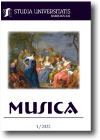COMPOSITIONAL PARTICULARITIES AND ASIAN INFLUENCES IN THE MUSICAL CONCEPTION AND WORKS OF JOHN CAGE
COMPOSITIONAL PARTICULARITIES AND ASIAN INFLUENCES IN THE MUSICAL CONCEPTION AND WORKS OF JOHN CAGE
Author(s): Mădălina Dana Rucsanda, Noémi KarácsonySubject(s): Music
Published by: Studia Universitatis Babes-Bolyai
Keywords: John Cage; Asia; Avant-garde; Hinduism; Buddhism; Zen; I-Ching; indeterminacy;
Summary/Abstract: One of the most important figures of the 20th century, avant-garde composer, artist, writer, and theorist John Cage was deeply influenced by various philosophical orientations from South and East Asia, such as Hinduism, Buddhism, Taoism, Zen, and I-Ching. He studied various doctrines and the works of several Asian philosophers, which resulted in the reorientation of his philosophical and aesthetic ideas. At the same time, this influenced his musical style, the conception of his compositions, as well as his thoughts on the functions of art – discernible in his music. Cage identified himself with certain ideas he encountered in the philosophical texts he studied, but he refrained from describing himself as representative of any of these orientations. Unlike other Western composers inspired by oriental art and music, Cage was rather influenced by the philosophical dimension of Asia. He avoided the use of Asian music sources in his works and was not interested in using new sounds for the sake of creating a novel musical discourse but aimed to evoke or emphasize certain philosophical ideas through his composition. The aim of the present paper is to present the Asian philosophical influences that marked the figure of John Cage, his perspective on life and art, and influenced his rhetoric, as well as the ideas that he employed within his compositional process.
Journal: Studia Universitatis Babes-Bolyai - Musica
- Issue Year: 67/2022
- Issue No: 1
- Page Range: 139-154
- Page Count: 16
- Language: English

